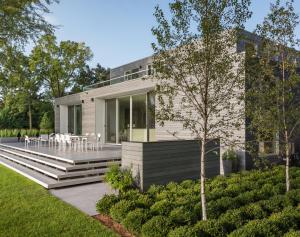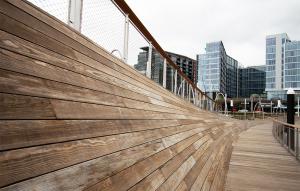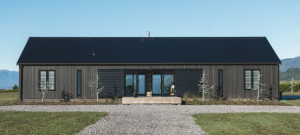What is Modified Wood
The aim of modified wood is to overcome the shortcomings of standard timber.
TELFORD, PA, UNITED STATES, February 14, 2020 /EINPresswire.com/ -- Modified wood is a term that describes the application of chemical, physical, or biological methods that are used to alter the cellular structure. The modification process enhances the performance of the wood, resulting in improvements in the longevity of timbers – dimensional stability, decay resistance, reduced water absorption, less expansion/contraction, etc. In addition, since most advanced modification processes are environmentally friendly, the materials can still be disposed of properly at the end of the product life cycle.CHEMICAL MODIFICATION OF WOOD – ACETYLATION
Typically, a process called acetylation is used to achieve chemically modified wood. It’s a chemical reaction that has been used for more than a century. In the simplest terms, the process subjects vinegar to a softwood, which turns it into a hardwood by preventing the cells in the wood from being able to absorb water.
The physical properties of any material are determined by its chemical structure. Wood contains an abundance of chemical groups called “free hydroxyls”. Free hydroxyl groups absorb and release water according to changes in the climatic conditions to which the wood is exposed. This is the main reason why wood swells and shrinks. It is also believed that the digestion of wood by enzymes initiates at the free hydroxyl sites – which is one of the principal reasons why wood is prone to decay.
Acetylation effectively changes the free hydroxyls within the wood into acetyl groups. This is done by the reaction wood has with acetic anhydride, which comes from acetic acid (vinegar when in diluted form). When the free hydroxyl group is transformed into an acetyl group, the ability of the wood to absorb water is greatly reduced, rendering the wood more dimensionally stable and extremely durable.
What is Accoya Wood®?
A great example of this chemical modification method in use is Accoya wood. Accoya is wood, but not as you know it. It is manufactured through the acetylation of plantation grown Radiata pine softwood.
Acetyl groups are already naturally present in all wood species. This means that the manufacturing process adds nothing to the wood that does not already naturally occur within it.
CHEMICAL/THERMAL MODIFICATION OF WOOD – FURFURYLATION
Thermally modified wood is redefining the properties, features, and applications of natural wood in a wide spectrum of residential and commercial applications.
Thermal modification is a process where the dimensional composition of wood is modified by applying heat in the absence of oxygen, which creates a controlled chemical reaction. Due to the lack of oxygen, the wood does not burn at high temperatures. The modification process permanently modifies the cell walls of the wood and typically results in the wood having a rich, brown color.
What is Kebony Wood®?
A great example of the thermal modification method is Kebony wood. The Kebony technology modifies wood by forming stable, locked-in furan polymers in the wood cell walls. These increase the dimensional stability, as well as durability and hardness, of the wood. This process is based on impregnation with furfuryl alcohol, which is produced from agricultural crop waste. Kebony thus uses a plant-derived waste product to give enhanced strength and durability to another plant product – namely wood.
What is ABODO Wood®?
ABODO wood is another wonderful option for thermally modified wood that is durable and rapidly renewable. The timber has exceptional weatherability and maintains its durability and beauty for a lifetime.
This wood is harvested from New Zealand’s FSC certified rapidly renewable Radiata pine plantation forests. They are ethically crafted with respect from beginning to end – which meets today’s increasing timber needs and green building practices without disadvantaging future generations.
CHARRED MODIFICATION PROCESS – SHOU SUGI BAN
The process of charring the surface of wood with a hot flame, namely sugi wood (Japanese cypress) as a preservation technique is thought to date back to the 1700s in Scandinavia and Japan. The technique entails burning enough of the surface to create a layer of char on the outside. The wood is then cooled and cleaned of loose soot and debris, then finished with oil.
reSAWN applies our own interpretation to the ancient Japanese shou sugi ban process. We take great pride in designing shou sugi ban products on high-performance modified woods. For exterior applications, we recommend shou sugi ban charred Accoya, Kebony, and ABODO. Using the modified wood as a base increases the durability of the wood which makes it an excellent choice for a dimensionally stable option that will perform well when exposed to harsh exterior conditions like snow, sun and rain. Plus, the charcoal stays on the surface of modified wood much better than standard softwood species that will chip over time.
At reSAWN TIMBER co. we celebrate and visually leverage wood’s inherent tendency to weather over time by designing modern, high-performance products that are meant to age in place with grace. We work with woods natural tendency to grey, not against it. Our products look beautiful on day one and continue to as nature takes over – with little to no aesthetic maintenance needed. Each board works cohesively together yet each board has its own visual story. The result is modern originality & inherent textural beauty with each and every project.
Mockup Program
If you’re interested to see how modified wood will perform on your project site, we offer a mockup program. Having a small amount of material on-site has many benefits:
specify material confidently knowing that the product suits the exact exterior conditions where the structure is being built
observe some amount of weathering
understand product appearance over a larger field of material
observe tolerance for wood movement in a project-specific climate
monitor effectiveness in rear ventilation & drainage through assembly details (i.e. rainscreen)
include all stakeholders in project to set realistic expectations for how wood will preform and weather
Samples of our standard products and modified wood offerings are available for architects and designers at no cost and shipped via UPS. Visit our website to view reSAWN’s complete product offering – sort by species, color or application.
Jocelyn Mahan
reSAWN Timber Co.
+1 215-709-2001
email us here
Legal Disclaimer:
EIN Presswire provides this news content "as is" without warranty of any kind. We do not accept any responsibility or liability for the accuracy, content, images, videos, licenses, completeness, legality, or reliability of the information contained in this article. If you have any complaints or copyright issues related to this article, kindly contact the author above.



